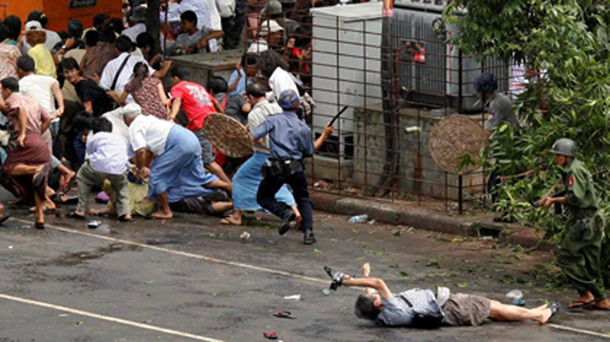RANGOON — Reporters Without Borders is appealing to President Thein Sein to set up a commission to probe the deaths of six journalists and photographers who have died at hands of Burma’s past military junta.
The Paris-based organization sent an open letter to Thein Sein ahead of his two-day visit to France, calling on him to “address impunity for the systematic crimes and violations against news providers during the years of repression.”
“We urge you to create a Commission of Enquiry dedicated to combatting impunity for crimes against news providers since 1962,” the group said in a statement. “[W]e believe that the process of democratization begun by your government will not be complete without an official effort to render justice for the victims of the military junta’s crimes.”
The group highlighted six recorded cases of journalists and photographers who were killed while carrying out their work in Burma between 1991 and 2007.
Perhaps the most high-profile among these cases is the killing of Japanese APF photographer and videographer Kenji Nagai. He was shot point blank by a soldier on the streets of Rangoon in September 2007 during a crackdown on the Saffron Revolution movement.
During the incident, which was recorded by the international media, a soldier was seen taking Nagai’s video camera. Reporters Without Borders said the camera should be returned to his friends and family. Tsutomu Haringet, a Japanese colleague of Nagai, said he had tried in vain to reclaim the camera in order to “pay a last tribute to his courageous work.”
Other cases include the death of Thar Win, a photographer with the government newspaper Kyemon. He died at an intelligence agency detention center in September 1999 after his newspaper carried a photograph of then spy chief Gen Khin Nyunt, with a hidden message calling him “the world’s biggest crook.”
Photographer Tin Maung Oo, who frequently worked for the National League for Democracy, died during the infamous Depayin Massacre in May 2003. He was struck on the head by the junta’s thugs when they carried out an attack on Aung San Suu Kyi’s motorcade.
“The commission’s main task should be to investigate and, as best as possible, to establish the circumstances in which these six journalists died,” Reporters Without Borders said, adding that it should also recognize and document the other abuses, such arrests, torture and detention, that members of Burma’s media have faced.
Since assuming office in 2011, Thein Sein has lifted some of the draconian media restrictions that were enforced under the previous military regime.
His nominally civilian government disbanded the government censorship board last year, released jailed journalists and allowed the publication of daily newspapers for the first time in decades.
Earlier this month, however, a controversial Printing and Publishing Enterprise Bill was passed in Burma’s Lower House.
Burma’s interim Press Council opposes the bill and is calling on Thein Sein and the Upper House to amend it, as the current bill would give the Ministry of Information broad powers to issue and revoke publishing licenses.

















